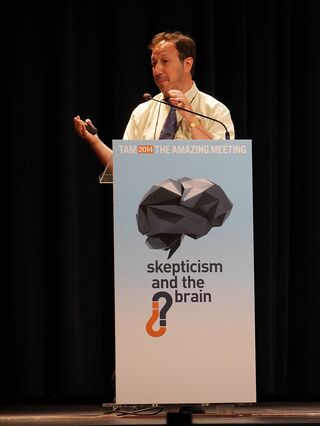Psychology
Reflecting on the Life and Legacy of Scott Lilienfeld
Scott Lilienfeld embodied the virtues of skepticism, humility, and curiosity.
Posted October 2, 2020 Reviewed by Devon Frye

Editor's Note: Psychologist Scott Lilienfeld passed away in late September 2020.
It was truly an honor to be one of Scott Lilienfeld’s graduate students at Emory University. There are few words to adequately capture what it meant and continues to mean for me to know that I am part of his legacy. To put it mildly, Scott was a prolific researcher, scholar, and contributor. Few people have revolutionized an entire field, and Scott was one such person, permanently changing the way people approach and think about psychological research.
I could spend far more than 1,000 words discussing his research contributions alone. From becoming one of the world’s leading experts on psychopathic personality to challenging how we conceptualize evidence-based treatments in psychotherapy, he was intellectually honest, courageous, and bold. As Carol Clark at Emory University wrote, Scott published more than 350 refereed journal articles and was “a fierce and courageous advocate for rigorous science in his field.” He contributed to countless popular press outlets, including Psychology Today (“The Skeptical Psychologist” blog series), wrote several books, served as the editor-in-chief of Clinical Psychological Science, and published one of the most widely used psychology textbooks.
Instead of describing his impressive and formidable research career, however, I want to highlight his contributions as a mentor and teacher. Scott was not only a titan in his field but he was an incredibly compassionate, respectful, and warm human being. It has been overwhelming, in a positive way, to witness the outpouring of genuine affection from the scientific community for Scott. Of all the stories shared on Twitter and other outlets, there is remarkable consensus (a level of agreement Scott would have been blown away by) that Scott was a steady friend and a kind voice. Numerous individuals have commented on Scott’s uncanny ability to make you feel as if you were his most important priority at the moment, whether it was a casual interaction during a conference or an email exchange.
Few professors take mentorship as seriously as Scott did in his life. His office door was literally always open to you, whether you were one of his students or not. I met Scott as an undergraduate at Emory University, joining the lab as a research assistant. Even at that point in time, when I knew next to nothing about psychology or research for that matter, he made time for me and other undergraduates in his lab. Once, as a senior doing my honors thesis in his lab, he took me on a campus tour to look at the new hospital construction on campus, buy me a quick coffee, and talk about the next steps for the research. That memory stands out to me now, as it truly reflects how much he thought of his students, even his undergraduate students, and wanted to be available to them.
I saw Scott every workday. This is no exaggeration. I would pop into his office first thing when I got to the building to say hello, and I would see him many times after that, whether over coffee or because he was popping into the lab space to check on us. We talked about my research almost daily, not in an oppressive, nagging way—he just loved his work so much that he was ready and able to discuss it at any time.
One of his greatest gifts as a mentor was his feedback on writing. He was an excellent and formidable writer who possessed a remarkable ability to craft lucid passages on complex topics. He would sit with us, of course over coffee (always over coffee), have us open a working draft, and do live editing with us. I did not recognize the value of these meetings at the time. Now, in hindsight, they are special in many ways. I can only aspire to be half the writer he was, but I learned countless lessons from those meetings. And they are reflections of his dedication to mentorship.
Scott was also a passionate and dedicated instructor. He approached teaching with the same level of enthusiasm and commitment as he did mentorship. From my perspective, watching Scott teach was watching someone enter into that dream “flow” state most of us can only hope to achieve. He spent considerable time crafting his lectures, pulling in resources, and making his lectures engaging. He would make time to chat with his students and his doors were similarly always open to students in his courses.
With Scott’s level of intelligence, fame, and influence, he could have been too busy or important to be involved with students at all levels of their education. Instead, he approached mentorship, teaching, and scholarship with true devotion. He made his students feel supported, as if they could accomplish anything they wanted to accomplish. He did so while also providing sage advice and realistic expectations.
As Scott himself once said, “the most one can do or hope for as an instructor is to change people’s lives in some small way and maybe make them get to think about their life and their worlds just a little bit differently.” I would say wholeheartedly that Scott achieved those goals and then some.
He has made a mark on so many lives, including my own life. He has made a mark on the field of clinical psychology and psychology at large, improving it for generations to come. I have been and will continue to be inspired by Scott every day, both personally and professionally. In his honor, I hope all of us can strive to even be just a little bit more intellectually humble, open-minded (but still skeptical), curious, and courageous.
The most important parts of his legacy, it seems, are to be kind, be thoughtful, and do good work.
References
Clark, C. (2020, October 1). Scott Lilienfeld remembered for advancing psychology while embodying kindness. Emory News Center. https://news.emory.edu/stories/2020/10/er_scott_lilienfeld_legacy/campu…
Emory College [@emorycollege]. (2020, September 30). Scott Lilienfeld reading why a student said he was her favorite professor [Video]. Instagram. https://www.instagram.com/p/CFxotiOhmts/?igshid=96z6k4myhsz




